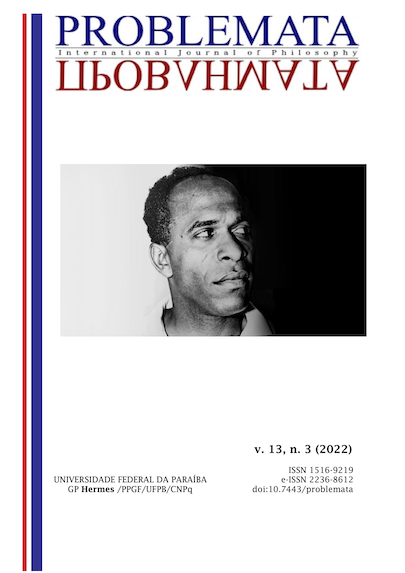EPICUREAN PIETY:
"DIVINITIES EXIST, BUT THEY SHOULD NOT BE MANIPULATED!"
DOI:
https://doi.org/10.7443/problemata.v13i3.64314Keywords:
Philosophy, Greek, DevotionAbstract
In this article, the objective is, based on a study of the Letter to Mencedus, to describe what Epicurus understands by eusebeia. Diogenes Laercio, in Lives and Doctrines of the Illustrious Philosophers, has translated texts that we will be studying here in order to deal with the proposal of this article. In a specific way, his doctrine of atoms is well grounded to understand his philosophy about the gods. This is a literature-based research, characterizing this work as a literature review. It is developed from two moments, namely about the wise life and about piety for the philosopher. Regarding the wise life, we have the attachment in the garden to friendship and wisdom. The practice of philosophy. The second part works on the idea that Epicurus teaches not to fear the gods. In view of these presentations it is possible to conclude that devotion to the gods is closely related to the praxis of a philosopher, that is, the happy life.
Downloads
References
ARISTOTELES. Retórica das paixões. Tradução de Isis Borges B. da Fonseca. São Paulo: 2000.
CARTA A MENECEU. In: LAÉRCIO, Diógenes. Vidas e doutrinas dos filósofos ilustres – Livro X – Epicuro. Introdução, tradução e notas de Lúcio Jakobsmuschel. Montecristo, 2020.
EPICURO. Sentenças Vaticanas. Tradução de Nasser Kassem Hammad. Dísponivel em: www.yumpu.com/pt/document/view/12792383/sentencas-vaticanas-traducao-. Acesso em: 16 ago. 2022.
EPISTOLA A HERODOTO. In: LAÉRCIO, Diógenes. Vidas e doutrinas dos filósofos ilustres – Livro X – Epicuro. Introdução, tradução e notas de Lúcio Jakobsmuschel. Montecristo, 2020.
EXPOSIÇÃO DA DOUTRINA DE EPICURO. In: LAÉRCIO, Diógenes. Vidas e doutrinas dos filósofos ilustres – Livro X – Epicuro. Introdução, tradução e notas de Lúcio Jakobsmuschel. Montecristo, 2020.
GOMES, Táuria Oliveira. A ética de Epicuro: um estudo da Carta a Meneceu. Revista eletrônica Print By UFSJ, n. 5, p. 147-162, 2003.
MAFFEZZOLLI, Marcone de Oliveira. O sentido da pragmateía epicurista. 2020. Tese (Doutorado) – Curso de Filosofia, Universidade Federal do Rio Grande do Norte, Natal, 2020.
MÁXIMAS PRINCIPAIS. In: LAÉRCIO, Diógenes. Vidas e doutrinas dos filósofos ilustres – Livro X – Epicuro. Introdução, tradução e notas de Lúcio Jakobsmuschel. Montecristo, 2020.
ROCHA, Gabriel Rodrigues. A filosofia como construção de si: Epicuro, o filósofo do jardim. Revista Reflexões, v.4, n. 4, p. 49-64. 2014.
SILVA, Markus Figueira. Sobre o estilo epistolar e aforismático de Epicuro. Kléos, n. 19, p. 247-258. 2015.
SILVA, Talita Nunes. Eusébeia: um valor do ‘sistema de conduta’ anteniense (V século a.C). Phoînix, v. 23, n. 1, p.108-123. 2017.
SOBRE A CONDUTA DE VIDA DO SÁBIO. In: LAÉRCIO, Diógenes. Vidas e doutrinas dos filósofos ilustres – Livro X – Epicuro. Introdução, tradução e notas de Lúcio Jakobsmuschel. Montecristo, 2020.
VERNANT, Jean-Pierre. Mito e religião na Grécia antiga. Tradução de Joana Angélica D’Avila Melo. São Paulo: Martins Fontes, 2006.
Downloads
Published
Issue
Section
License
Copyright (c) 2022 Marcel Alcleante Alexandre de Sousa

This work is licensed under a Creative Commons Attribution 4.0 International License.
Authors who publish with this journal agree to the following terms:
- Authors retain copyright and grant the journal right of first publication with the work simultaneously licensed under a Creative Commons Attribution License that allows others to share the work with an acknowledgement of the work's authorship and initial publication in this journal.
- Authors are able to enter into separate, additional contractual arrangements for the non-exclusive distribution of the journal's published version of the work (e.g., post it to an institutional repository or publish it in a book), with an acknowledgement of its initial publication in this journal.
-
- Authors are permitted and encouraged to post their work online (e.g., in institutional repositories or on their website) prior to and during the submission process, as it can lead to productive exchanges, as well as earlier and greater citation of published work (See The Effect of Open Access).





